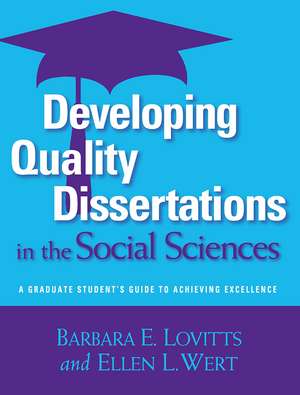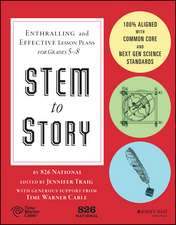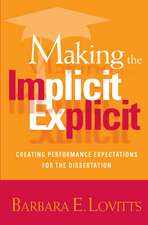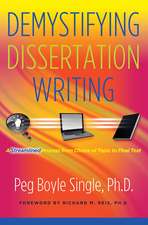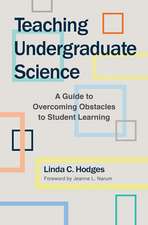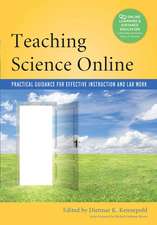Developing Quality Dissertations in the Social Sciences: A Graduate Student's Guide to Achieving Excellence
Autor Barbara E. Lovitts, Ellen L. Werten Limba Engleză Paperback – 31 dec 2008
Preț: 117.03 lei
Preț vechi: 144.09 lei
-19% Nou
Puncte Express: 176
Preț estimativ în valută:
22.39€ • 23.44$ • 18.64£
22.39€ • 23.44$ • 18.64£
Carte tipărită la comandă
Livrare economică 01-15 aprilie
Preluare comenzi: 021 569.72.76
Specificații
ISBN-13: 9781579222611
ISBN-10: 1579222617
Pagini: 48
Dimensiuni: 219 x 285 x 10 mm
Greutate: 0.09 kg
Ediția:1
Editura: Taylor & Francis
Colecția Routledge
Locul publicării:Oxford, United Kingdom
ISBN-10: 1579222617
Pagini: 48
Dimensiuni: 219 x 285 x 10 mm
Greutate: 0.09 kg
Ediția:1
Editura: Taylor & Francis
Colecția Routledge
Locul publicării:Oxford, United Kingdom
Public țintă
Postgraduate and Professional Practice & DevelopmentCuprins
List of Tables; Preface. To the Faculty; Preface. to the Student; 1. Identifying the Purpose of the Dissertation; 2. Understanding Originality and Significance; 3. Aiming for Excellence in the Dissertation; 4. Maintaining Consistent Quality Within the Dissertation; 5. Achieving Excellence; Appendix A. Tasks of the Social Sciences Division; Appendix B. Advice for Writing a Social Sciences Dissertation; Making the Implicit Explicit. About the Study; About the Authors.
Notă biografică
Barbara E. Lovitts is an independent higher education researcher. She was formerly Senior Program Officer in the Center for the Advancement of Scholarship on Engineering Education at the National Academy of Engineering, and is the author of Leaving the Ivory Tower: The Causes and Consequences of Departure from Doctoral Study. She has worked at the University of Maryland, the American Institutes for Research, the National Science Foundation, and the American Association for the Advancement of Science. Ellen L. Wert , a former a program officer at The Pew Charitable Trusts, is a freelance writer and editor who has been involved with national efforts to improve U.S. graduate education for nearly two decades, including Preparing Future Faculty, the Carnegie Initiative on the Doctorate. and the Survey on Doctoral Education and Career Preparation. Past clients include the American Association for Higher Education, The Brookings Institution, the Carnegie Foundation for the Advancement of Teaching, and the Education Policy Institute
Recenzii
"If you are a new doctoral student or a master student thinking about obtaining a doctoral degree within the next few years, please prepare for the live orientation session in August by getting a copy of one of these Lovitts & Wert booklets (from Stylus Publications; also available in the University bookstore and Library), and reading it. We think that you will want your own copy to keep notes as you work your way through your degree program.
Lovitts BE, Wert EL (2009) Developing Quality Dissertations in the Sciences: A Graduate Student’s Guide to Achieving Excellence. [Includes specific advice for the disciplines of biology, physics, engineering and mathematics, but also applies to chemistry, behavioral neuroscience in psychology, materials science, and nursing.]
Lovitts BE, Wert EL (2009) Developing Quality Dissertations in the Social Sciences: A Graduate Student’s Guide to Achieving Excellence. [Includes specific advice for the disciplines of economics, sociology, and the social science subdisciplines of psychology, but also applies to anthropology, education, history, management, and political science.]
Lovitts BE, Wert EL (2009) Developing Quality Dissertations in the Humanities: A Graduate Student’s Guide to Achieving Excellence. [Includes specific advice for the disciplines of English, philosophy, and the humanities subdisciplines of history, but also applies to art history and comparative literature.]"
SUNY Binghampton’s Instructions to Graduate Students
"Overall, this booklet is informative and provides a good starting point for the creation of a rubric of measurable quality indicators for the assessment of dissertation quality. Students and advisors alike will benefit from taking the authors' advice and initiating discussions regarding their individual expectations and objectives, clarifying the objective of a dissertation, and making it a more productive and enjoyable process for everyone involved."
NACADA Journal
“These booklets are a terrific resource for graduate students who want to learn what faculty members look for in a quality dissertation. They will also prove useful to faculty as they convey explicit expectations to their students about a quality dissertation.”
Karen L. Klomparens, Dean and Associate Provost for Graduate Education, Michigan State University
COMMENT ON "DEVELOPING QUALITY DISSERTATIONS IN THE SCIENCES"
"I read the science booklet as if I were a beginning grad student and thinking about such matters for the first time. I was pleased—the booklet seemed like it was speaking directly to me. I found the writing to be crisp, conversational and compelling. It exceeded my expectations."
Louis Sherman, Professor, Biological Sciences, Purdue University, West Lafayette, IN, and member, “Making the Implicit Explicit” advisory committee.
"These booklets are a useful tool for demystifying the culminating element of doctoral studies--the dissertation. I recommend that students use them to initiate conversations with their advisors about how to achieve high quality dissertations."
Chris M. Golde, Associate Vice Provost for Graduate Education, Stanford University, and member, “Making the Implicit Explicit” advisory committee.
Lovitts BE, Wert EL (2009) Developing Quality Dissertations in the Sciences: A Graduate Student’s Guide to Achieving Excellence. [Includes specific advice for the disciplines of biology, physics, engineering and mathematics, but also applies to chemistry, behavioral neuroscience in psychology, materials science, and nursing.]
Lovitts BE, Wert EL (2009) Developing Quality Dissertations in the Social Sciences: A Graduate Student’s Guide to Achieving Excellence. [Includes specific advice for the disciplines of economics, sociology, and the social science subdisciplines of psychology, but also applies to anthropology, education, history, management, and political science.]
Lovitts BE, Wert EL (2009) Developing Quality Dissertations in the Humanities: A Graduate Student’s Guide to Achieving Excellence. [Includes specific advice for the disciplines of English, philosophy, and the humanities subdisciplines of history, but also applies to art history and comparative literature.]"
SUNY Binghampton’s Instructions to Graduate Students
"Overall, this booklet is informative and provides a good starting point for the creation of a rubric of measurable quality indicators for the assessment of dissertation quality. Students and advisors alike will benefit from taking the authors' advice and initiating discussions regarding their individual expectations and objectives, clarifying the objective of a dissertation, and making it a more productive and enjoyable process for everyone involved."
NACADA Journal
“These booklets are a terrific resource for graduate students who want to learn what faculty members look for in a quality dissertation. They will also prove useful to faculty as they convey explicit expectations to their students about a quality dissertation.”
Karen L. Klomparens, Dean and Associate Provost for Graduate Education, Michigan State University
COMMENT ON "DEVELOPING QUALITY DISSERTATIONS IN THE SCIENCES"
"I read the science booklet as if I were a beginning grad student and thinking about such matters for the first time. I was pleased—the booklet seemed like it was speaking directly to me. I found the writing to be crisp, conversational and compelling. It exceeded my expectations."
Louis Sherman, Professor, Biological Sciences, Purdue University, West Lafayette, IN, and member, “Making the Implicit Explicit” advisory committee.
"These booklets are a useful tool for demystifying the culminating element of doctoral studies--the dissertation. I recommend that students use them to initiate conversations with their advisors about how to achieve high quality dissertations."
Chris M. Golde, Associate Vice Provost for Graduate Education, Stanford University, and member, “Making the Implicit Explicit” advisory committee.
Descriere
This is one of three short booklets designed to be given to graduate students as they begin their studies. These booklets explain the purposes of the dissertation and the criteria by which it will be assessed.
